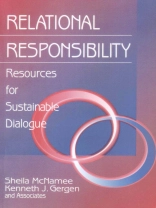The tradition of individual responsibility where individuals deliberate, morally evaluate, and then decide on a course of action is dear to the heart of Western ethical and legal codes and informs many contemporary practices of therapy, education, and organizational life. It also typically isolates, alienates, and ultimately invites the eradication of the otherùa step toward non-meaning. A vast range of current thinking places this view of the independently responsible individual in strong question. In Relational Responsibility, the authors attempt to transform the concept of responsibility in such a way that the relational process replaces the individual as the central concern. This volume invites practices that replace alienation and isolation with meaning-building dialogue. It is structured in a way that demonstrates their ideas. In Part I, Mc Namee and Gergen examine relational responsibility followed by their analysis of a challenging case study involving the issue of child sexual abuse. Part II contains responses from scholars and practitioners from the fields of communication, psychology, therapy, and organizational development that extend the original dialogue set out by Mc Namee and Gergen. Part III is a rejoinder to Part II in redirecting and augmenting the original conception and practice of relational responsibility. Relational Responsibility touches on a number of different disciplines, including communication theory, sociology, social theory, interpersonal and group communication, conflict management, and child abuse.
Spis treści
Preface – Sheila Mc Namee and Kenneth J Gergen
Situating the Conversation
PART ONE:RELATIONAL RESPONSIBILITY
An Invitation to Relational Responsibility
Relational Responsibility in Practice
A Case in Point
PART TWO: EXPANDING THE DIALOGUE: RESONANCE AND REFIGURATION
When Stories Have Wings – David Cooperrider and Diana Whitney
How Relational Responsibility Opens New Options for Action
Collaborative Learning Communities – Harlene Anderson
Relational Moves and Generative Dances – Ian Burkitt
On Being Relational in an Accountable Way – John W Lannamann
The Questions of Agency and Power
The Uncertain Path to Dialogue – Sallyann Roth
A Meditation
Relational Responsibility – Mary Gergen
Deconstructive Possibilities
Relational Responsibility or Dialogic Ethics? A Questioning of Mc Namee and Gergen – Stanley Deetz and William J White
Responding and Relating – Michael J Mazanec and Steve Duck
Response-Ability to Individuals, Relating and Difference
Co-Constructing Responsibility – Karl Tomm
Inspiring Dialogues and Relational Responsibility – Eero Riikonen
Creating Relational Realities – John Shotter and Arlene M Katz
Responsible Responding to Poetic `Movements′ and `Moments′
Relational Inquiry and Relational Responsibility – Robert Cottor and Sharon Cottor
The Practice of Change
A Circle of Voices – Peggy Penn and Marilyn Frankfurt
`Just Like Max′ – Walter Eggers
Learning in Relation
Waiting for the Author – Maurizio Marzari
PART THREE: CONTINUING THE CONVERSATION
Relational Responsibility – Sheila Mc Namee and Kenneth J Gergen
The Converging Conversation
O autorze
Kenneth J. Gergen is a Senior Research Professor in Psychology at Swarthmore College, and the President of the Taos Institute. He is internationally known for his contributions to social constructionist theory, technology and cultural change, the self, aging, education, and relational theory and practices. His major writings include, Realities and Relationships: Soundings in Social Construction, The Saturated Self: Dilemmas of Identity in Contemporary Life, and Relational Being: Beyond Self and Community. His most recent work Beyond the Tyranny of Testing: Relational Evaluation in Education (with Scherto Gill) offers a relational constructionist alternative to the destructive practices of testing and grading in education. Gergen lectures throughout the world, and has received numerous awards for his work, including honorary degrees in both the U.S. and Europe.












